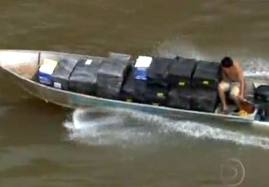Corruption facilitates action by criminals at borders
In the second report in the special series, reporters caught the illegal arms trade, the supply of drugs, smuggling in the rivers and even the falsification of Inmetro stamps.
By Jornal Nacional, Globo, 31/05/2011
Corruption facilitates action by criminals on Brazilian borders (external link)
In the second report in the special series on Brazilian land borders, reporters Cesar Tralli, Robinson Cerântula and Fernando Ferro show the illegal arms trade, the supply of drugs, the smuggling in rivers and even the forgery of Inmetro stamps. All of this facilitated by corruption.
Where there is a popular shopping street in Paraguay, there is almost always a gun shop. There are 32 alone on the border with Paraná. For sale, there are automatic pistols of great precision, the same ones used in Brazil to assault and kill.
Smuggling to Foz do Iguaçu is guaranteed. “Delivery there in Foz. If you want, right now, I'll take it to you. It depends on the movement. It can take 15 minutes, half an hour, an hour. Pass ”, guaranteed the seller.
It is by motorcycle that weapons enter illegally in Brazil. One of them, apprehended crossing the Amizade bridge, had an automatic pistol being carried on the false bottom of the bank. On another motorcycle, the gun was being transported inside the oil reservoir.
The movement is frantic. There are 30 bikes per minute passing over the bridge.
“It is a very fast, agile transport and the staff here would be kind of unfeasible to inspect all the bikes that pass. It is not 100% efficient ”, admitted the police officer of the National Security Force Breno Nogueira Amaral.
Five hundred kilometers above the border line and another dangerous crime corridor: the passage from Pedro Juan Caballero, in Paraguay, to Ponta Porã, in Mato Grosso do Sul. It is practically impossible to know where one city ends and where the other begins, in another country. It is like this over more than ten kilometers.
Our producers took a tour of the center. In just ten minutes, they heard all kinds of offers: ammunition, fake medicine, cocaine.
The novelty of the moment, in the region, is the counterfeit Inmetro stamp to push the contraband of baby strollers and deceive the consumer in Brazil.
In a store, there is also a counterfeit for a motorcycle helmet. The salesman is brazen in the lie: "If you put the seal on, you are already Brazilian," he said.
A wholesale blow: “If you take it with you, it's cheaper. If you take only one, it is R $ 5 ”.
Inmetro's quality seal is a requirement of the law. Only safety equipment approved in stress tests can be sold. The fake seal helmet that the JN team bought in Paraguay splits in half in the test.
“It cannot be used, at all. It does not offer security or protection to the user ”, warned an Inmetro employee.
Health at stake also with pirated cigarettes. “There are even counterfeit stamps from the Federal Revenue of Brazil. It is proof that the cigarette is destined for the Brazilian market ”, highlighted the employee.
There are 60 factories on the Paraguayan side and almost all production is smuggled.
"If Paraguay produces 65 billion cigarettes and consumes only 3 billion, we have this differential all poured into the Brazilian market," said Luciano Barros, of the Brazilian Association to Combat Counterfeiting.
It is through water that 70% of all muds cross the border from Paraguay to Brazil. In a 200 km strip, 3 thousand crossing points have already been mapped, the so-called clandestine ports.
The Jornal Nacional reporting team caught young people and teenagers carrying boxes and more swap boxes. A boat loaded with goods and a boy just carrying them. The boy hid his face so as not to appear.
At night, an anthill of people picking up swag from the bank and transporting it into Brazil. This year alone, the Federal Police has seized 50 loaded boats. But it is still difficult to catch large fish, as the owners of the merchandise.
“It is difficult because the lake is so large. Our workforce is not the ideal workforce we would need to work ”, admitted Federal Police agent Celso Calori.
A Brazilian man is a manager of a clandestine port in Foz do Iguaçu. It serves six gangs of smugglers.
“I take this illegal cargo and distribute it in several warehouses. Houses, shed, in several places. It goes to all of Brazil. They come from different regions: Minas, São Paulo, Bahia, it comes from all over the place, ”he said.
The criminal says that every transport and distribution scheme is driven by corruption. “I pay a bribe to be able to work smoothly. It depends, it varies from R $ 50, up to R $ 1.000, R $ 10, ”he revealed.
"Those who do not pay the required amount cannot even transit the goods at that location," reported prosecutor Rudi Burkler.
The promoter of the fight against organized crime in Foz do Iguaçu has already denounced 160 municipal guards, civilian and military police.
"Certain police officers, for sure, live more on the remuneration obtained from this corruption than on the salary itself," he declared.
The head of the Federal Revenue Division of the states of Paraná and Santa Catarina, Sérgio Lorente, declared that there is a mapping of clandestine ports and that he is waiting for federal resources to resume large-scale operations on the border.
According to the Paraná Public Security Secretariat, this year, eight civil police officers were dismissed for misconduct. And in the past three years, 130 military police have been removed.
The Federal Police reported that, with the increase in the number of civil servants in the Foz de Iguaçu and Guaíra units, there was an increase in inspection operations in the region.




